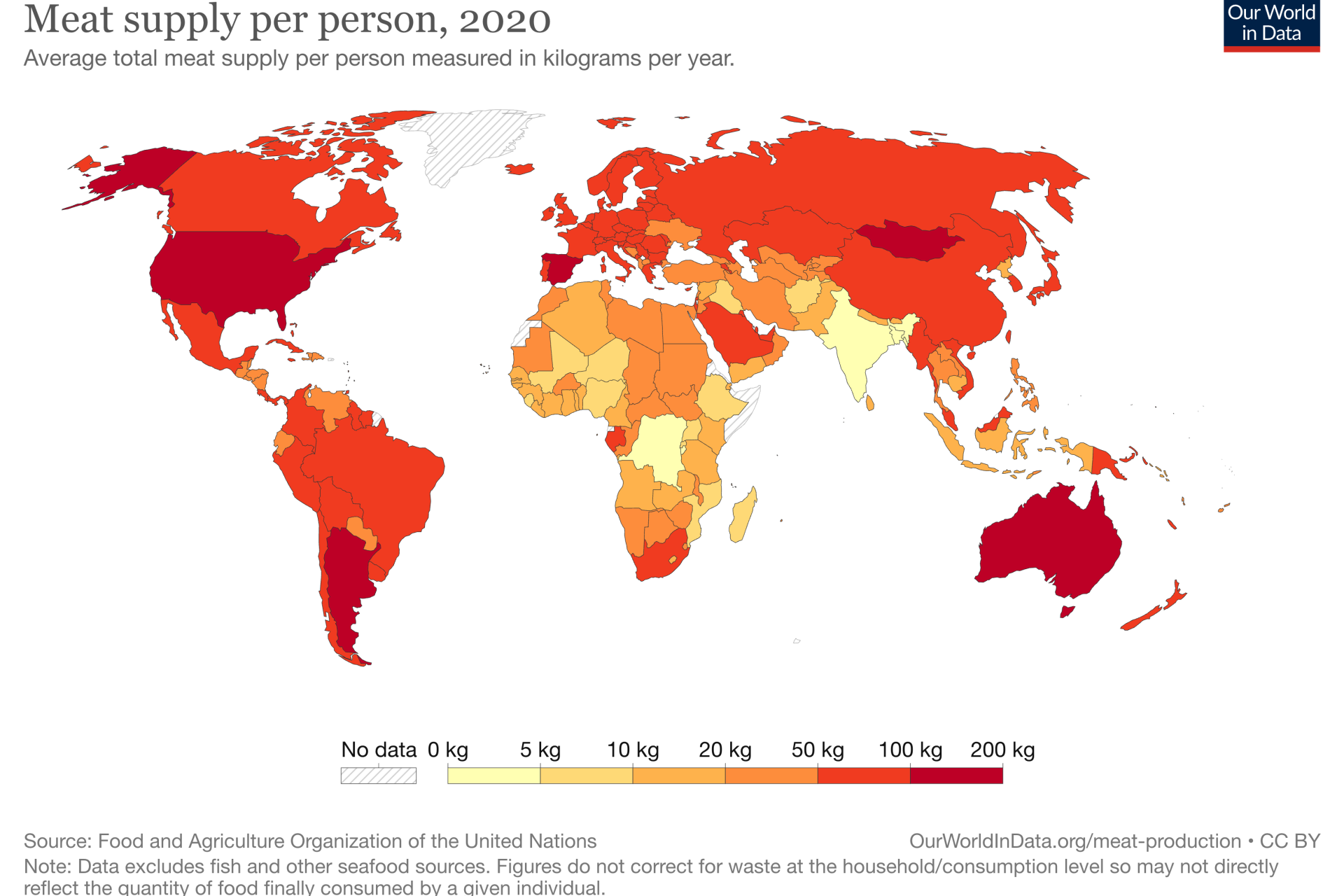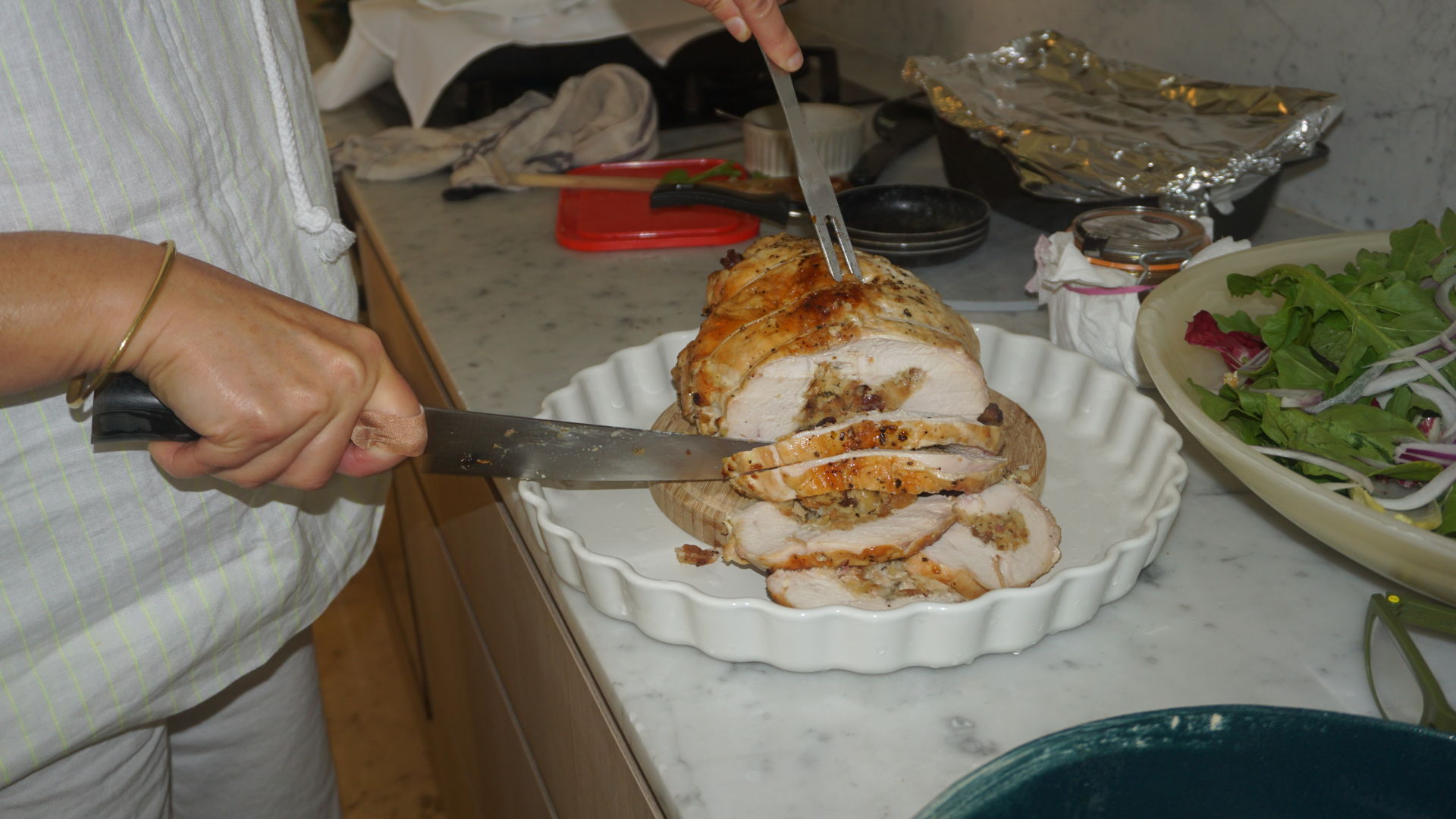From an evolutionary standpoint, meat was an essential part of the development of the human species – cooked meat, that is. Capitalism has hijacked the significant essential development and deep seeded reward for meat consumption, destroying the planet and causing immense suffering for profit (Gertenbach et al., 2021). Animal produce like meat contains a higher nutrient density and protein content to plant alternatives. Scientific theories suggest that animal produce and the cooking of meat was a major player for the development of early human brains, manifesting in what we call “culture, social dynamics, linguistics, and complex thought” (Gibbons, 2014; Ham, 2022).
Trust – as a social construct – is crucial to our survival, especially within small tight knit communities. Humans are hardwired to trust one another, with our brain chemistry rewarding us on the basis of social cues. For example, if you help someone hunt or provide them with a resource, the expectation is that you get protection, help, or a share of resources, surmounting to an early society built on trust and common goals. Complex plans for paleolithic hunting and gathering, especially for larger prey, must have been communicated effectively. When provided with high dietary food like meat, hunting, and consequently language worked to strengthen social bonds, brain chemistry and neural pathways (Pobiner, 2013; Sloat, 2022). Complex communication and social structures created a shared reliance on others to the benefit of the community (Aiello & Wheeler, 1995). However, gaining trust towards dangerous activities, like hunting, is kind of a “hard ask” and was justifiably rare, not to mention the success and death rates of these hunts (Ham, 2022). The act of hunting for food places a significance on it, and if a member of your community died to get your food to your plate, a certain importance and appreciation for it is justified. This is how life was mostly for approximately 300,000 years, nomadic, tight knit, and short lived (Siegel, 2022).

Approximately 12,000 years ago, someone thought, “hey, wouldn’t it be easier if we just had the food right next to us all the time?” Dubbed the “Neolithic Revolution”, traditional hunter-gatherer lifestyles were out and permanent settlements, farming, money, and specialisation were in! This proximity to food meant that for the first time in biological history, people could specialise in niche skills. Survival was no longer a key focus. Farming and later the industrial revolution forever changed the human lifestyle, as well as changing our perception of food. Meat has become so abundant that some people consider meals without animal produce as not a ‘proper meal’. Currently, 26% of Earth's land area is dedicated entirely to feeding and pastures for livestock to graze on. 83% of Earth's total farmland is used as a medium for pasture and fodder crops for livestock development, and the resulting combination consumes roughly 26% of the Earth's total freshwater supply (Torrella, 2022). A kilogram of a conventionally farmed steak consumes 25 kg of grain and 15,000L of water and, on average, emits 71 kg of emissions (Hoekstra & Mekonnen, 2012; Ritchie et al., 2017).
In 2013, a scientific inquiry into the agricultural sectors found that the excess food fed to livestock has the nutritional value to feed approximately 4 billion people (Cassidy et al., 2013). This isn’t talking about the inedible food which cows and other herbivores eat like soybean husks, grass and food waste, but real grain, maize and vegetables safe for human consumption. Currently, 50 million people in 45 countries are teetering on the edge of famine, with an estimated 828 million people already in total food poverty (WFP, 2022). Amidst this horrific number of potential famines, a change in agriculture will be the key to mitigating the disastrous effects of overpopulation and climate change. Contributing roughly 15% to global emissions, arguably the worst result of meat production is the destruction of forests for farmland (Conrad et al., 2018; Dunne, 2018; Milman, 2021). Not only does this release the CO2 bound in the flora and carbon storage in soils, but also destroys natural carbon sequestration and cycling, not to mention the carbon released via the transportation of said meat products (Ritchie et al., 2017). The global agricultural sector is known to be the primary driver of biodiversity loss, having threatened 24,000 of the 28,000 (86%) species at risk of extinction. Extinction rates aren’t slowing down either. A side effect of capitalism is the inherent dissociation from consequences. While the agricultural industry clears forests, the average American disposes of roughly half a kilogram of meat alone daily (Conrad et al., 2018). The overproduction and overconsumption of meat is directly related to wealthier countries with late-stage capitalistic tendencies (Gertenbach et al., 2021). Both Australia and the USA are prime examples of this, having the highest and second highest meat consumption rates globally (Ritchie et al., 2017). In the context of modern human society, the production and consumption of meat is no longer rare but a harmful medium, and certainly is not well done.
Respect for the food on one's plate and small diet changes may be the best way to mitigate the damage the meat industry has done to the Earth. The most straightforward and readily accessible option is to opt out of consuming meat every day. Many Western countries have developed a skewed ideal for meal standards directly related to the influence of late-stage capitalism. This is derived from the integral view that the natural world is a ‘resource’, something to be extracted for all its worth, rather than a beautiful natural phenomenon. In terms of the meat industry, an individual’s choice can impact the system drastically. Plant-based diets are hypothesised to free up 3 billion hectares of land. This translates to a 75% reduction of space used by livestock (PETA, 2010; Poore & Nemecek, 2018; Ritchie, 2021). Another solution is eliminating beef, mutton, and dairy production, which produce the most harmful emissions and take up the majority of agricultural land. This would vacate half of the space currently used in livestock farming alone (Ritchie, 2021). A liveable future is a goal that can be achieved through industry and individual change. The best way for an individual to make this goal a reality is to change what they eat. The best way for a business to make this goal a reality is with government subsidies, change in business practices, empathy, and most certainly with mindful consumer choices. Hurting companies with your wallet is both ethical and where corporations will feel it the most. While I’m not saying everyone should be vegan, we need to teach people to have a better understanding and respect for where their food comes from and how it impacts the world around us.
An open letter to the Australian household
You can make a difference. This letter is a realistic way in which you can be a part of a legacy and a future that is not only fun for the whole family, but is also a wholesome way to change the world.
Ingredients:
Chickpeas, lots of Chickpeas
A pinch of will power
A cup of negotiation tactics for the naySayers
3x plashes of Kindness
A load of Empathy
Spices (of your choice)
Compassion
A healthy dose of Humility
Flax seed (for the vegan option)
Things to remember:
As a person within a capitalistic society, your obligation to hold conglomerate companies accountable for the actions and presence they have on your life is essential. In terms of climate change and food production, your say in what you demand from a company will be the way that company moves forward, therefore, it is imperative that you hold them accountable. Demand a higher standard of ethics and morals from your world. Avoid the easy traps for capitalism being, complicit, docile, and dumb does no favours to you or the future.
A recipe to eat less meat:
Step one:
Pick a day. Any day will do. It could be a Monday, and Tuesday, maybe even a Saturday if you’re feeling spicy. Don’t eat meat on this day.
Step two:
Brag to your friends about how you don’t eat meat on this one day. Get a vegan cookbook or google some vegetarian recipes. Julian Solomita videos are fantastic for inspiration.
Step three:
Think about where your meat comes from. You specifically are the result of 3.4 billion years of evolution, so too is the chicken at KFC. Is the meat produce you’ve purchased actually sustainable and ethical? (Hot tip; organic and ethical are not the same and research into companies should not be understated).
Step four:
If you see a company isn’t doing what they should, demand a higher standard from them. Hold them accountable. The easiest way is to not give them your money.
Step five:
Be suspicious of companies greenwashing and educate yourself and others of the harmful ways in which big industry can harm the planet.
Step six:
Rinse and repeat, maybe add another day…
Optional step:
Go outside, go on walk, put your phone down, algorithms are designed to keep you there and that’s just what they’ll do. Break the cycle.
References
Aiello, L. c., & Wheeler, P. (1995). The Expensive-Tissue Hypothesis: The Brain and the Digestive System in Human and Primate Evolution on JSTOR. Jstor.org. https://www.jstor.org/stable/2...
Cassidy, E. S., West, P. C., Gerber, J. S., & Foley, J. A. (2013). Redefining agricultural yields: from tonnes to people nourished per hectare. Environmental Research Letters, 8(3), 034015. https://doi.org/10.1088/1748-9...
Conrad, Z., Niles, M. T., Neher, D. A., Roy, E. D., Tichenor, N. E., & Jahns, L. (2018). Relationship between food waste, diet quality, and environmental sustainability. PLOS ONE, 13(4), e0195405. https://doi.org/10.1371/journa...
Dunne, D. (2018). Interactive: What is the climate impact of eating meat and dairy? Carbonbrief.org. https://interactive.carbonbrie...
Gertenbach, L., Lamla, J., & Laser, S. (2021). Eating ourselves out of industrial excess? Degrowth, multi-species conviviality and the micro-politics of cultured meat. Anthropological Theory, 146349962098154. https://doi.org/10.1177/146349...
Gibbons, A. (2014). The Evolution of Diet. National Geographic. https://www.nationalgeographic...
Ham, K. (2022, February 7). Early Human Development—the Result of a High Meat Diet? Answers in Genesis; Answers In Genesis. https://answersingenesis.org/h...
Hoekstra, A. Y., & Mekonnen, M. M. (2012). The water footprint of humanity. Proceedings of the National Academy of Sciences, 109(9), 3232–3237. https://doi.org/10.1073/pnas.1...
Milman, O. (2021, September 13). Meat accounts for nearly 60% of all greenhouse gases from food production, study finds. The Guardian; The Guardian. https://www.theguardian.com/en...
PETA. (2010, June 23). Fight the Climate Crisis by Going Vegan | PETA. PETA. https://www.peta.org/issues/an...
Pobiner, B. (2013). Evidence for Meat-Eating by Early Humans | Learn Science at Scitable. Nature.com. https://www.nature.com/scitable/knowledge/library/evidence-for-meat-eating-by-early-humans-103874273/#:~:text=The%20first%20major%20evolutionary%20change,least%202.6%20million%20years%20ago.
Poore, J., & Nemecek, T. (2018). Reducing food’s environmental impacts through producers and consumers. Science, 360(6392), 987–992. https://doi.org/10.1126/scienc...
Ritchie, H. (2021). If the world adopted a plant-based diet we would reduce global agricultural land use from 4 to 1 billion hectares. Our World in Data. https://ourworldindata.org/lan...
Ritchie, H., Rosado, P., & Roser, M. (2017, August 25). Meat and Dairy Production. Our World in Data. https://ourworldindata.org/mea...
Sloat, S. (2022, January 24). Did eating meat make us human? New research casts some doubt. NBC News; NBC News. https://www.nbcnews.com/scienc...
Siegel, E. (2022, October 12). What Was It Like When The First Humans Arose On Earth? Forbes. https://www.forbes.com/sites/s...
Torrella, K. (2022, February). This is how much meat and dairy hurt the climate. Vox; Vox. https://www.vox.com/future-per...
WFP. (2022). A global food crisis | World Food Programme. Wfp.org. https://www.wfp.org/global-hunger-crisis#:~:text=2022%3A%20a%20year%20of%20unprecedented,on%20the%20edge%20of%20famine.


 -
-